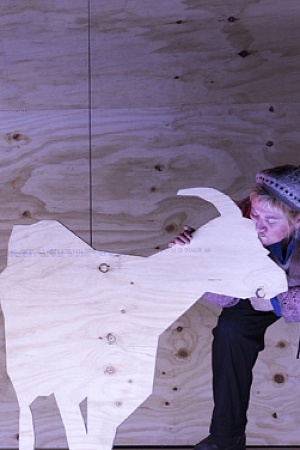Bliss (Malthouse Theatre) ★★★
The opening of Peter Carey’s satirical novel Bliss (1981), where the body of Harry Joy lies dead on the lawn while his spirit hovers above, is one of the most memorable in modern Australian literature. Harry’s laconic out-of-body narration hovers like a spare and airy jazz riff until a defibrillator jolts him back into the land of the living, and a newly recognised living hell. It’s not an easy scene to stage, and in Tom Wright’s adaptation at Melbourne’s Malthouse Theatre, it’s been dismembered.
Instead of lying there and letting others do the talking, Harry Joy, in his famous grubby white suit, enters the bare stage and tells us the story of how his father met his mother, ‘the vision splendid’, during a flood of biblical proportions. In the novel, this comes later in Part One, partly to establish that Joy is a vivid storyteller. But in the play’s opening scene, another actor steps forward to tell us what we see in the novel; that Harry is about to die, on a green lawn beneath a banana palm, with a cigarette burning between his fingers. Instead of a green lawn, or the bare floor of the stage, Harry enters a small glass greenhouse and expires there.
It is not the most promising of openings but the play improves, thanks to pacey direction by Matthew Lutton and an ensemble cast that crackles with talent and energy. Especially enjoyable is Marco Chiappi’s performance as Harry’s colleague, Alex Duval, who assumes Joy’s identity, in an exaggeratedly languid performance, later in the play. Toby Truslove plays Harry Joy more as a mild-mannered, troubled everyman than as a charismatic Good Bloke, an archetype that Carey uses to sum up the male-dominated, parochial and mediocre society of 1980s Australia. But then, the Good Bloke, with his self-satisfied bonhomie and unexamined sense of entitlement, is what Harry Joy, after his short death, has ceased to be. He is now the Questioning Bloke, the Angst-ridden Bloke, the Bloke with a Social Conscience, who realises that some of the products his successful advertising agency sells cause cancer.
Continue reading for only $10 per month. Subscribe and gain full access to Australian Book Review. Already a subscriber? Sign in. If you need assistance, feel free to contact us.










Leave a comment
If you are an ABR subscriber, you will need to sign in to post a comment.
If you have forgotten your sign in details, or if you receive an error message when trying to submit your comment, please email your comment (and the name of the article to which it relates) to ABR Comments. We will review your comment and, subject to approval, we will post it under your name.
Please note that all comments must be approved by ABR and comply with our Terms & Conditions.